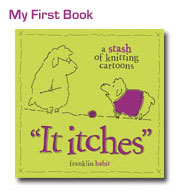The family into which I was born is, to put it mildly, informal.
You know those holiday commercials that show gleaming, symmetrical groups of soft-spoken kin around a mahogany dinner table, with the paterfamilias doling out a turkey without getting grease on his necktie? We were not that family. We had as much in common with that family as we did with nomadic Mongolians and those tribes in the Amazon that didn't see white people until the 60s, or whenever it was. Come think of it, we probably have more in common with the Amazonians.
As a child, this drove me nuts.
I was thoroughly convinced by age six that I was a changeling. My "father" and "mother" were satisfactory for all practical purposes. They kept me clothed and fed. But they could not possibly be my real parents. My real parents would not eat off paper plates, or hang around the house on Saturdays in jeans and t-shirts. My real parents threw cocktail parties, dressed for dinner, and–the height of glamour to my infant mind–would take me to Puerto Vallarta on the Pacific Princess for my birthday.
A lot of little kids try to run away from home. Not me. I parked myself on the curb in front of the house, with Raggedy Ann under one arm and a book under the other, and waited for my real parents to drive by in their limousine and pick me up.
It embarrasses me now that this way of thinking didn't fade as I grew older, it just morphed into a desperate need to claw my way to the top of a society that, I have since learned, really only ever existed in my head.
When I arrived at Harvard as a freshman, determined to make myself over into the second coming of Oliver Barrett, my obsession with etiquette began. Having heard that proper manners were the ticket into elevated circles, I set about to acquire them.
I missed.
My parents, I have since realized, had already taught me manners. What I learned at Harvard was etiquette. Extremely formal etiquette. Antiquated etiquette. Etiquette of a sort that only the people who hang around with Queen Liz need to know. Etiquette of a sort that helped change me, for a time, from a dizzy but not unpleasant person into a crashing, boring snob.
Have you ever met a 17-year-old whose fondest desire is engraved stationery and visiting cards? Who issues formal invitations to a Christmas party in his dorm room? And requires equally formal, written RSVPs? Who is so concerned with questions of precedent when introducing a mixed company of ladies and gentlemen of various ages that he nearly passes out from the strain? Who flies home for winter break in a coat and tie because he feels people ought to wear traveling clothes?
Through the grace of God, I have since calmed down. Mostly. I still want the stationery and the cards.*
The remant of this bizarre fascination is my collection of etiquette books and domestic manuals. Below is a small section of the shelf.
Even at this small size, you will doubtless note that they're mostly, ahem, slightly out of date. But that's one of the reasons I love them so. When I read them now, it's not so much for reference as to immerse myself in a world that, if it ever existed, is now long gone.
Take, for example, the 1920s edition of Emily Post. It's the fat blue book just to the right of Manners for Women. Just for one day, I would like to trade problems Mrs. Worldly, who is to my mind Miss Post's most enduring contribution to English literature.
Mrs. Worldly, a hefty dame who perches at the top of the social pyramid in a fur coat, would appear to live a life of perfect ease. But no. Daily, nightly, she wrestles with:
- How to survive a "camping trip" to the Adirondacks without her maid, because she cannot do her own hair.**
- Housemaids who noisily stack dinner plates one atop the other when clearing the table.
- Changing clothes four times a day when in Newport.
- Remembering the different hours appropriate for making social calls in Newport, Boston, New York, Philadelphia, and Washington, DC.
- Properly addressing members of the royal family when visiting England.
In the years since college, I've come to appreciate my freewheeling parents and my goofy family. I've learned that something Birdfarm once said to me, which at the time made me grit my teeth, was quite true: "It's really just about being nice to people."
On the other hand, if you need to know how to Properly Cross a Ballroom Floor Without an Escort, I'm your man.
*And I still believe firmly in the importance of not only good manners, but of a certain level of practical etiquette. Humans are unpredictible, and their interactions are fraught with the possibility of conflict. When you give those interactions a framework, it helps keep things civil. It's a good thing, if you don't take it too far and use it to shut people out.
**She ultimately solves the problem by wearing a fur hat the entire time. I would never have thought of that.




206 comments:
«Oldest ‹Older 201 – 206 of 206Keep writing really. Thank you for sharing this excellent article.
Great Blog Post Keep Wrighting Like This and Thanks for Sharing
Your ability to present well-researched, insightful, and thought-provoking content in such a structured and engaging manner makes learning a truly enriching experience, as you encourage readers to explore new ideas with curiosity and enthusiasm.
USA Jacket Store
awesome post
female to male body massage
female to male body massage chennai
This is a very nice article. I never Saw these type of Blogs.
Store locations are presented in a straightforward format: https://vape-store-mumbai.com/locations/
Post a Comment